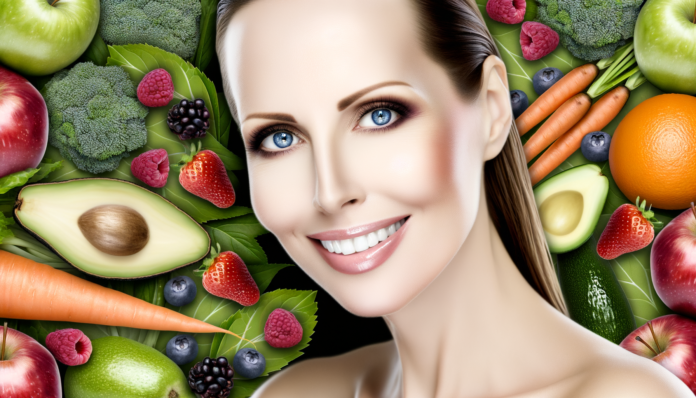Introduction
The Connection Between Diet and Skin Health
In the contemporary quest for radiant and glowing skin, individuals frequently find themselves navigating through a myriad of skincare products, often underestimating the pivotal role that nutrition plays in the pursuit of healthy and vibrant skin. Amidst the shelves of serums, creams, and cleansers, the timeless adage “you are what you eat” resounds with profound significance, especially when it comes to the health and appearance of your skin. While topical treatments certainly play a role, the foundation for luminous and naturally beautiful skin is laid within the realms of a well-balanced, nutrient-rich diet.
Our skin, being the largest organ, is a direct reflection of our internal health, and what we choose to nourish our bodies with can have a profound impact on its vitality. Here, we will delve into the intricate relationship between nutrition and skincare, shedding light on the profound ways in which the foods we consume can either enhance or detract from the natural radiance of our skin.
Why This Matters: The Emotional and Physical Impact of Acne
Acne is more than just a skin condition; it can have significant emotional and physical impacts. For many, acne can lead to feelings of self-consciousness, anxiety, and even depression. The physical discomfort of acne, including pain and inflammation, can also affect one’s quality of life. Understanding the connection between diet and skin health is crucial because it offers a proactive approach to managing and potentially alleviating acne. By making informed dietary choices, individuals can support their skin health from the inside out, reducing the severity and frequency of breakouts and improving their overall well-being.
Overview of the Article
This article aims to provide a comprehensive guide on how diet influences skin health. We will explore the following sections:
- Understanding Your Skin: A look at basic skin anatomy, common skin issues, and factors influencing skin health.
- Nutrients for Radiant Skin: The essential vitamins, minerals, antioxidants, and the role of hydration in maintaining healthy skin.
- Foods to Embrace for Healthy Skin: Highlighting fruits, vegetables, healthy fats, probiotics, and hydrating foods that benefit the skin.
- Foods to Avoid for Clear Skin: Identifying dietary culprits like sugar, dairy, and processed foods that can trigger skin issues.
- Creating a Skin-Friendly Diet Plan: Tips for balancing nutrients, meal planning for busy lifestyles, and sample meal plans and recipes.
- Conclusion: Recap of key points, encouragement for your skin health journey, and additional resources for further reading.
By the end of this article, you will have a deeper understanding of how your diet can influence your skin’s health and practical tips to incorporate skin-friendly foods into your daily routine. Let’s embark on this journey to achieve radiant, healthy skin from the inside out.
Understanding Your Skin
Basic Skin Anatomy and Functions
Your skin is the largest organ of your body, serving as a protective barrier against environmental hazards. It consists of three primary layers: the epidermis, dermis, and hypodermis.
- Epidermis: The outermost layer, which provides a waterproof barrier and creates our skin tone. It contains cells called keratinocytes, which produce keratin, a protein that strengthens the skin.
- Dermis: Located beneath the epidermis, this layer contains tough connective tissue, hair follicles, and sweat glands. It is rich in collagen and elastin fibers, which provide skin with strength and elasticity.
- Hypodermis: The deeper subcutaneous tissue made of fat and connective tissue. It helps insulate the body and protects underlying muscles and other structures.
Each layer plays a crucial role in maintaining skin health, from providing a barrier to producing essential oils and sweat that help regulate body temperature and protect against infections.
Common Skin Issues: Acne, Sensitivity, and Aging
Skin issues can arise due to various factors, including genetics, environmental exposure, and lifestyle choices. Here are some common skin problems:
- Acne: Often caused by clogged pores, excess oil production, and bacteria. Hormonal changes, diet, and stress can exacerbate acne.
- Sensitivity: Characterized by redness, itching, and irritation. Sensitive skin can react to certain skincare products, environmental factors, and even dietary choices.
- Aging: Natural aging leads to wrinkles, fine lines, and age spots. Factors like sun exposure, smoking, and poor diet can accelerate the aging process.
Understanding these issues is the first step in addressing them through both skincare routines and dietary adjustments.
Factors Influencing Skin Health
Several factors influence the health and appearance of your skin:
- Diet: Nutrient-rich foods provide the building blocks for healthy skin. Vitamins, minerals, antioxidants, and healthy fats are essential for maintaining skin integrity and combating damage.
- Hydration: Adequate water intake is crucial for maintaining skin moisture and elasticity. Dehydration can lead to dry, flaky skin and exacerbate conditions like eczema.
- Sun Exposure: UV radiation can cause significant damage, leading to premature aging and increasing the risk of skin cancer. Sunscreen and protective clothing are vital.
- Genetics: Your genetic makeup can determine your skin type and susceptibility to certain skin conditions.
- Lifestyle Choices: Smoking, alcohol consumption, and stress can negatively impact skin health. Regular exercise and adequate sleep, on the other hand, promote a healthy complexion.
By understanding these factors, you can make informed decisions to support your skin’s health through both lifestyle and dietary choices.
Nutrients for Radiant Skin
Vitamins and Minerals: The Building Blocks
Vitamins and minerals are essential for maintaining healthy skin. They act as the building blocks that support various skin functions, from cell regeneration to collagen production.
- Vitamin C: Known for its powerful antioxidant properties, vitamin C helps protect the skin from oxidative stress caused by free radicals. It is also crucial for collagen synthesis, which maintains skin elasticity. Excellent sources of vitamin C include citrus fruits, strawberries, bell peppers, and leafy greens like spinach.
- Vitamin E: Another potent antioxidant, vitamin E protects skin cells from damage caused by UV rays and environmental pollutants. It supports skin barrier function and helps maintain moisture levels. Nuts, seeds, avocado, and vegetable oils are rich sources of vitamin E.
- Vitamin A: Essential for skin cell production and turnover, vitamin A promotes a smooth and even complexion. It helps prevent signs of aging by supporting collagen production and reducing the appearance of fine lines and wrinkles. Sources include sweet potatoes, carrots, leafy greens, and liver.
- Zinc: This mineral plays a critical role in regulating oil production and supporting skin healing processes. It has anti-inflammatory properties that can help manage acne and other inflammatory skin conditions. Oysters, lean meats, whole grains, and legumes are excellent sources of zinc.
- Selenium: A trace mineral that works alongside antioxidants to protect skin cells from damage, selenium supports skin elasticity and may help reduce the risk of sun damage. Brazil nuts, seafood, whole grains, and eggs are good dietary sources of selenium.
Antioxidants: Protecting Your Skin from Damage
Antioxidants are compounds that neutralize free radicals, unstable molecules that can damage skin cells and accelerate aging. By incorporating antioxidant-rich foods into your diet, you can protect your skin from oxidative stress and maintain a youthful appearance.
- Polyphenols: These plant compounds have strong antioxidant properties that help protect the skin from UV damage and improve skin elasticity. Green tea, dark chocolate, berries, and red grapes are rich sources of polyphenols.
- Omega-3 Fatty Acids: Found in fatty fish like salmon, walnuts, and flaxseeds, omega-3 fatty acids offer anti-inflammatory benefits that can calm irritated skin and reduce redness. They help maintain the skin’s lipid barrier, improving hydration and overall skin texture.
- Collagen Peptides: A specialized form of collagen that can be consumed as a supplement, collagen peptides support skin elasticity and hydration. They help maintain skin firmness and reduce the appearance of wrinkles. Collagen peptides can be derived from fish, bovine, or chicken sources.
Hydration: The Role of Water in Skin Health
Hydration is fundamental to skin health. Water supports cellular function, regulates body temperature, and maintains skin elasticity. Drinking an adequate amount of water each day helps flush out toxins and keeps skin hydrated from within.
- Water-Rich Foods: Consuming fruits and vegetables with high water content, such as cucumbers, tomatoes, and watermelon, can contribute to the body’s hydration needs.
- Hyaluronic Acid: While not a nutrient per se, hyaluronic acid is a molecule that attracts and retains moisture in the skin, promoting a plump and hydrated appearance. It can be found in bone broth, soy-based foods, and as an ingredient in topical skincare products.
By focusing on these essential nutrients, you can support your skin’s health from the inside out, leading to a more radiant and youthful complexion.
Foods to Embrace for Healthy Skin
Fruits and Vegetables: Nature’s Skin Superfoods
Fruits and vegetables are packed with essential vitamins, minerals, and antioxidants that are crucial for maintaining healthy skin. **Vitamin C**, found in citrus fruits, strawberries, and bell peppers, is vital for collagen production, which helps keep the skin firm and youthful. **Beta-carotene**, present in carrots, sweet potatoes, and leafy greens, converts to vitamin A in the body, promoting skin cell turnover and repair. Additionally, the antioxidants in berries, such as blueberries and raspberries, help protect the skin from oxidative stress and environmental damage.
Healthy Fats: Omega-3s and Skin Elasticity
Healthy fats, particularly omega-3 fatty acids, play a significant role in maintaining skin elasticity and moisture. Omega-3s, found in fatty fish like salmon, mackerel, and sardines, as well as in flaxseeds and walnuts, help reduce inflammation and keep the skin hydrated. These fats are essential for maintaining the skin’s lipid barrier, which locks in moisture and keeps irritants out. Including these sources of healthy fats in your diet can lead to smoother, more supple skin.
Probiotics: Gut Health and Skin Connection
The health of your gut microbiome can have a profound impact on your skin. Probiotics, found in fermented foods like yogurt, kefir, sauerkraut, and kimchi, help maintain a balanced gut flora, which in turn supports overall skin health. A healthy gut can improve nutrient absorption, reduce inflammation, and enhance the skin’s natural barrier function. Incorporating probiotic-rich foods into your diet can help manage skin conditions like acne and eczema, promoting a clearer and more radiant complexion.
Hydrating Foods: Keeping Your Skin Moisturized
Hydration is key to maintaining healthy, glowing skin. While drinking plenty of water is essential, consuming hydrating foods can also contribute to your skin’s moisture levels. Foods with high water content, such as cucumbers, tomatoes, watermelon, and celery, help keep the skin plump and hydrated. These foods not only provide hydration but also deliver essential vitamins and minerals that support skin health. Including a variety of hydrating foods in your diet can help maintain a dewy, youthful appearance.
By embracing these nutrient-rich foods, you can nourish your skin from the inside out, promoting a healthy, radiant complexion.
Foods to Avoid for Clear Skin
Sugar and High-Glycemic Foods: Acne Triggers
Consuming foods high in sugar and with a high glycemic index can wreak havoc on your skin. These foods cause rapid spikes in blood sugar levels, leading to increased insulin production. Elevated insulin levels can trigger a cascade of hormonal changes that increase oil production and inflammation, both of which are key contributors to acne. Common high-glycemic foods include white bread, sugary cereals, pastries, and sugary beverages. To maintain clear skin, it is advisable to limit these foods and opt for low-glycemic alternatives like whole grains, legumes, and vegetables.
Dairy: The Controversial Culprit
Dairy products have long been a subject of debate when it comes to their impact on skin health. Some studies suggest that dairy, particularly skim milk, can exacerbate acne. This is thought to be due to the presence of hormones and bioactive molecules in milk that can stimulate oil glands and lead to clogged pores. While not everyone will experience skin issues from dairy, those who are prone to acne may benefit from reducing or eliminating dairy products from their diet. Alternatives such as almond milk, soy milk, and oat milk can be good substitutes.
Processed Foods: Inflammation and Skin Health
Processed foods are often laden with unhealthy fats, sugars, and artificial additives, all of which can contribute to systemic inflammation. Chronic inflammation is a known factor in various skin conditions, including acne, eczema, and psoriasis. Foods like fast food, packaged snacks, and processed meats can exacerbate these conditions by promoting inflammatory responses in the body. To support clear and healthy skin, it is best to minimize the intake of processed foods and focus on whole, nutrient-dense options like fresh fruits, vegetables, lean proteins, and whole grains.
By being mindful of these dietary choices, you can take significant steps toward achieving and maintaining clear, radiant skin.
Creating a Skin-Friendly Diet Plan
Balancing Nutrients: A Holistic Approach
Achieving radiant skin requires a balanced intake of essential nutrients. A holistic approach to diet ensures that your skin receives the vitamins, minerals, and antioxidants it needs to thrive. **Vitamins A, C, and E** are crucial for skin repair and protection, while **omega-3 fatty acids** help maintain skin hydration and reduce inflammation. **Zinc** supports oil production and wound healing, and **selenium** works alongside vitamins to protect against oxidative damage. Incorporating a variety of nutrient-dense foods into your diet can help you achieve a glowing complexion.
Meal Planning Tips for Busy Lifestyles
Maintaining a skin-friendly diet can be challenging, especially with a busy schedule. Here are some practical tips to help you stay on track:
- Prep Ahead: Spend a few hours each week preparing meals and snacks. Chop vegetables, cook grains, and portion out servings to save time during the week.
- Batch Cooking: Prepare large batches of skin-friendly meals like soups, stews, and casseroles that can be easily reheated.
- Healthy Snacks: Keep healthy snacks like nuts, seeds, and fresh fruit on hand to avoid reaching for processed options.
- Hydration: Carry a water bottle with you to ensure you stay hydrated throughout the day. Herbal teas and infused water can also be refreshing alternatives.
- Smart Choices: When dining out, opt for dishes that include plenty of vegetables, lean proteins, and healthy fats. Avoid sugary drinks and desserts.
Sample Meal Plans and Recipes
To help you get started, here are some sample meal plans and recipes that are packed with skin-boosting nutrients:
Day 1
- Breakfast: Overnight oats with chia seeds, topped with fresh berries and a drizzle of honey.
- Lunch: Quinoa salad with mixed greens, cherry tomatoes, cucumber, avocado, and a lemon-tahini dressing.
- Snack: A handful of almonds and a green apple.
- Dinner: Grilled salmon with a side of roasted sweet potatoes and steamed broccoli.
Day 2
- Breakfast: Smoothie made with spinach, banana, almond milk, and a scoop of protein powder.
- Lunch: Whole grain wrap filled with hummus, shredded carrots, bell peppers, and spinach.
- Snack: Greek yogurt with a sprinkle of flaxseeds and a few slices of kiwi.
- Dinner: Stir-fried tofu with mixed vegetables (bell peppers, snap peas, and mushrooms) served over brown rice.
Day 3
- Breakfast: Avocado toast on whole grain bread, topped with a poached egg and a sprinkle of chili flakes.
- Lunch: Lentil soup with a side of mixed greens salad dressed with olive oil and balsamic vinegar.
- Snack: Carrot sticks with a side of hummus.
- Dinner: Baked chicken breast with a quinoa and kale salad, dressed with lemon and olive oil.
By following these meal plans and incorporating these tips into your daily routine, you can create a diet that supports your skin health and overall well-being. Remember, consistency is key, and making small, sustainable changes can lead to significant improvements in your skin’s appearance over time.
Conclusion
Recap of Key Points
As we have explored throughout this article, the connection between diet and skin health is profound and multifaceted. **Nutrients such as vitamins, minerals, antioxidants, and essential fatty acids** play crucial roles in maintaining and enhancing the health and appearance of your skin. **Hydration** is fundamental, as water helps maintain skin moisture and elasticity. **Fruits and vegetables** provide essential vitamins and antioxidants that protect the skin from damage and promote repair. **Healthy fats**, particularly omega-3 fatty acids, support skin barrier function and reduce inflammation. **Probiotics** contribute to a healthy gut, which in turn can improve skin conditions. Conversely, certain foods like **sugar, high-glycemic foods, dairy, and processed foods** can trigger or exacerbate skin issues such as acne and inflammation.
Encouragement for Your Skin Health Journey
Embarking on a journey to improve your skin health through diet can be both exciting and rewarding. Remember, **consistency is key**. Changes in your diet may not yield immediate results, but over time, you will likely notice significant improvements in your skin’s texture, clarity, and overall radiance. **Listen to your body** and observe how different foods affect your skin. Everyone’s skin is unique, and what works for one person may not work for another. Be patient and give your body the time it needs to adjust to new dietary habits. **Celebrate small victories** along the way, whether it’s fewer breakouts, reduced redness, or a more hydrated complexion. Your skin health journey is a marathon, not a sprint, and every positive change you make brings you one step closer to achieving radiant, healthy skin.
Additional Resources for Further Reading
For those interested in delving deeper into the relationship between diet and skin health, here are some recommended resources:
- “The Role of Nutrition in Skin Health” – National Center for Biotechnology Information (NCBI)
- “Nutrition and Skin Health” – American Academy of Dermatology (AAD)
- “12 Foods Scientifically Proven to Help You Get Healthier Skin” – Healthline
- “Diet and Dermatology: The Role of Dietary Intervention in Skin Disease” – NCBI
- “The Impact of Diet on Skin Health” – Dermatology Times
By incorporating the insights and recommendations from this article into your daily life, you can take proactive steps towards achieving and maintaining healthy, glowing skin. Remember, the journey to radiant skin starts from within, and your diet is a powerful tool in your skincare arsenal.



